|
|
|
Sort Order |
|
|
|
Items / Page
|
|
|
|
|
|
|
| Srl | Item |
| 1 |
ID:
178020
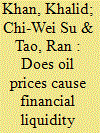

|
|
|
|
|
| Summary/Abstract |
This study measures whether oil prices affect financial liquidity (FL) in the Kingdom of Saudi Arabi (KSA). The results indicate a positive association between oil prices (OP) and FL in the medium run. FL led OP in the short run during the global financial recession, when the KSA used foreign reserves to stabilize the impact of low OP. Similarly, geopolitical risk (GR) led OP in the medium term and had a positive influence on FL in the short term, especially during periods of higher uncertainty. The correlation between OP and FL becomes more noticeable in the medium term in the presence of GR. Short-run volatility can exert pressure on foreign reserves, which can be effectively managed by keeping reserves in the national currency. Similarly, economic growth sources other than oil income and a peaceful solution to regional differences can reduce defense spending.
|
|
|
|
|
|
|
|
|
|
|
|
|
|
|
|
| 2 |
ID:
105834
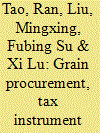

|
|
|
|
|
| Publication |
2011.
|
| Summary/Abstract |
In this paper, we argue that China's grain procurement system as a major instrument in rural taxation survived the communes and lost its importance only gradually in recent years. However, as agricultural liberalization progressed, the traditional tax instruments of 'tax deduction prior to grain procurement payment' and implicit taxation through 'price scissors' gradually eroded. Under such a circumstance, local governments in agriculture-based regions resorted to informal fees collected directly from individual rural households while the more industrialized regions shifted to non-agricultural taxes that are less costly in terms of tax collection. Empirical evidence based on a large panel data set supports our hypotheses of rural taxation in China.
|
|
|
|
|
|
|
|
|
|
|
|
|
|
|
|
| 3 |
ID:
076905
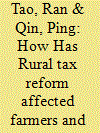

|
|
|
|
|
| Publication |
2007.
|
| Summary/Abstract |
Using nationally representative data, the present paper examines the impact of China's ongoing rural tax reform on farmers. The difficulties in further local governance restructuring are also discussed. It is argued that the issues associated with rural taxation and local governance in China result from inherent tension between an increasingly liberalized economic system and a still centralized political system. Although rural tax reform has helped to reduce farmers' tax burdens in the short term, the establishment of an effective local governance regime requires coordinated reforms to downsize local bureaucracy by providing social security for laid-off cadres, to strengthen local accountability by granting higher local formal tax autonomy, and to promote meaningful participation by expanding local democracy.
|
|
|
|
|
|
|
|
|
|
|
|
|
|
|
|
| 4 |
ID:
178628
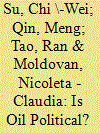

|
|
|
|
|
| Summary/Abstract |
This paper investigates the political property of oil from the perspective of geopolitical risk (GPR). We explore the relationship between GPR and oil price (OP) by performing the full-sample and subsample rolling-window bootstrap Granger causality tests. We find that wars will lead to an increase in OP but that low GPR cannot lead to an immediate decline in price. This finding can also be explained by economic crises, which can make OP soar while GPR is low. In turn, the rise in OP has a positive impact on GPR. The oil market has a significant interaction with geopolitical events, which reflects the pattern of global politics, so we can conclude that oil has a political property. In the context of a tense and complex global relationship, the world can benefit from the political property of oil to prevent GPR, which can in turn facilitate an accurate prediction of OP to reduce the adverse effects of large fluctuations in the oil market.
|
|
|
|
|
|
|
|
|
|
|
|
|
|
|
|
| 5 |
ID:
113690


|
|
|
|
|
| Publication |
2012.
|
| Summary/Abstract |
To explain China's dramatic economic growth, researchers have proposed a "tournament thesis." According to this thesis, the central government's ability to set growth targets has played a crucial role in growth since political promotion is largely based on local economic growth. We use provincial officials' career mobility data to test this thesis. For both time periods (1979-1995 and 1979-2002), economic performance, measured in annual, average and relative terms, did not affect these officials' career advancement. We then sketch an alternative analytical framework to explain Chinese local officials' strong urge for developmentalism and, finally, draw policy implications from this explanatory framework.
|
|
|
|
|
|
|
|
|
|
|
|
|
|
|
|
| 6 |
ID:
110259


|
|
|
|
|
| Publication |
2012.
|
| Summary/Abstract |
China's fiscal arrangement in the 1980s has preserved local governments' incentive but the 1994 fiscal reform recentralized revenues. Since then, farmers' tax burdens have risen steeply and become a major challenge to the state legitimacy. How to account for the huge regional variation? Why were some localities able to tax more heavily than others? Based on a national survey of village governance in China, we examine farmers' burdens empirically and identify political and social factors that explain the local governments' ability to tax farmers. This paper suggests that developments since the 1990s have shown that it overstates local discretionary power and does not pay enough attention to societal forces in understanding local public finance.
|
|
|
|
|
|
|
|
|
|
|
|
|
|
|
|
| 7 |
ID:
092871
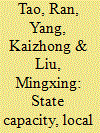

|
|
|
|
|
| Publication |
2009.
|
| Summary/Abstract |
Continued urban-rural income disparity poses a serious policy challenge in China's economic transition. As the Chinese economy booms and the state's fiscal capacity grows, there should be a corresponding increase in the center's capacity to redress urban-rural inequality. However, it seems that the stronger state extractive capacity since the mid-1990s has not translated into better urban-rural disparity outcomes. Based on a panel data set covering 270 prefectures in China between 1994 and 2003, the article evaluates the impact of local fiscal spending on urban-rural income disparity. Findings reveal a strong urban bias in China's local fiscal system under an increasingly centralized fiscal system. The centralized fiscal model has in fact reinforced this tendency and ironically weakened the capacity of the central state in achieving the policy goal of reducing the urban-rural divide.
|
|
|
|
|
|
|
|
|
|
|
|
|
|
|
|
| 8 |
ID:
121741
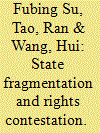

|
|
|
|
|
| Publication |
2013.
|
| Summary/Abstract |
The functionalist reasoning of institutional changes builds on individual rationality and explains institutional changes from the demand side. While insightful, a comprehensive understanding also needs to take into account the supply side. The state, as the ultimate supplier of institutional changes, plays the pivotal role of agency; therefore, its willingness and ability decide how such regime change occurs and what particular form the new regime takes. Since the mid-1990s, the Chinese economy has embarked on a path of rapid industrialization and urbanization. The contestation over rural land development rights in China offers an excellent case to illuminate the importance of state agency in institutional changes. Drawing on case studies in China's three major urbanizing regions, this article analyzes how villages brought their own land directly to the land market and reaped handsome profits. We argue that the three successful cases, Nanhai in Guangdong, Kunshan in Jiangsu and Zhenggezhuang in Beijing, all represent a product of active agency on the supply side. The Chinese state's fragmented authority provides a favorable institutional environment for such changes.
|
|
|
|
|
|
|
|
|
|
|
|
|
|
|
|
| 9 |
ID:
133813
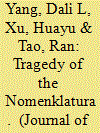

|
|
|
|
|
| Publication |
2014.
|
| Summary/Abstract |
We review James Kung and Shuo Chen's study, published in the American Political Science Review, on the causes of China's Great Leap Famine (1959-1961). Kung and Chen explain the variations in provincial leaders' radicalism on the basis of the career incentives facing the provincial First Secretaries. In this article, we question the validity of their basic assumptions and also uncover serious issues with the Kung and Chen dataset. We conclude that their empirical findings were based on faulty foundations. Our alternative hypothesis instead explains the dynamics of political radicalism during the Great Leap Forward in terms of the provincial leaders' political loyalty to Mao. Our findings point to the significance of political networks in influencing the behavior of elites and, by extension, political and socio-economic outcomes.
|
|
|
|
|
|
|
|
|
|
|
|
|
|
|
|
|
|
|
|
|